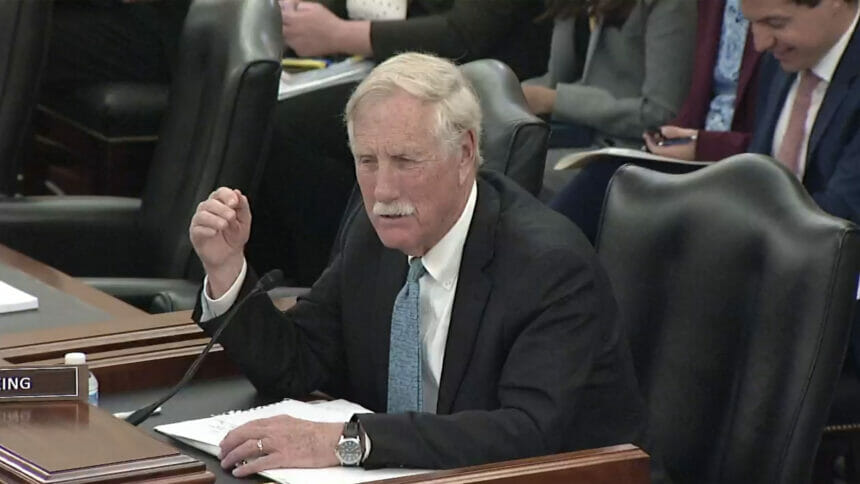
A pair of US Senators have asked the Centers for Medicare & Medicaid Services to stop the proposed federal staffing rule for nursing homes, saying that “unintended consequences” of the mandate could force the closure of veterans’ facilities.
US Sens. Kevin Cramer (R-ND) and Angus King, pictured, (I-ME) voiced their concerns in a letter sent Thursday to CMS Administrator Chiquita Brooks-LaSure. The two senators sit on the Senate Veterans Affairs Committee and represent states with significant rural areas.
“Our entire healthcare system is currently grappling with a severe shortage of qualified nurses and caregivers,” the letter states. “We recognize the importance of high-quality service, but as drafted and without revisions, this proposal may have unintended consequences that will close nursing homes.”
The letter noted that the senators raised similar concerns during a committee hearing June 7, 2023, in which they discussed the “distinct lack of available nurses and the vulnerability of our rural facilities across North Dakota and Maine” with Jonathan Blum, CMS’ principal deputy administrator and chief operating officer.
“These dynamics create additional challenges for our State Veterans’ Homes and community nursing facilities serving veterans,” Thursday’s letter said. “Considering the existing workforce challenges, we noted the potential for any direct staffing standard to inadvertently exacerbate the problem. While we share the agency’s desire to advance policies aimed at improving quality of care for seniors, our rural nursing facilities have limited options to address the lack of clinical staff available in their localities, and the proposed rule will exacerbate the problem.”
The letter is the second public missive Cramer and King have signed asking CMS to stop moving ahead with the staffing rule that calls for a minimum of 3.0 hours of direct care per patient per day with 0.55 hours by a registered nurse and 2.45 hours by a nurse aid. The two senators signed a letter Sept. 29 with 26 of their colleagues reiterating concerns about the damage the mandate could do to facilities and the long-term care industry.
In addition to concerns about veterans’ facilities, Cramer and King said in their latest communique that they were “disappointed” that CMS did not include hours from licensed practical nurses in the agency’s required care times.
“Nursing facilities across our states employ a substantial number of LPNs and rely on these professionals to support our veterans and seniors alike,” they wrote. “The decision to discount LPN staffing as part of any staffing minimum requirement appears misguided. We urge the department to reconsider this approach and instead look for a way in which we can promote greater collaboration among all clinical staff for the benefit of facility residents.”
The staffing rule proposal includes two carve-outs for rural facilities that appear to be a nod toward the concerns raised by senators who represent rural states. Nursing homes in rural areas would be given five years (instead of three that others would get) to come into compliance with the mandate and one extra year to meet the proposed 24/7 RN coverage while other facilities would have just two years after the rule is finalized to meet this requirement.
The rule also includes a hardship exemption for facilities that are located at least 20 miles from another long-term care facility, but Cramer and King said that distance “appears to be arbitrarily set.”
“The proposed 20-mile component appears to be arbitrarily set and may prevent needed, temporary relief for long-term care facilities; it is entirely plausible that multiple facilities within a 20-mile radius of one another would need exemptions given regional staffing constraints,” they wrote.
Public comments on the proposed staffing rule are due by Nov. 6. So far, nearly 7,800 comments have been posted on the Federal Register website.





